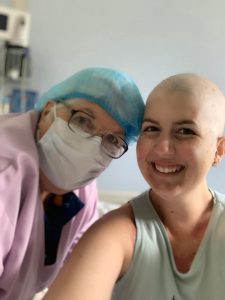Medical PTSD Is a Reality for Many of Us Living with a Rare Disease
Written by |

I wake up sweating.
I feel tears pouring down my cheeks, and my throat is sore from screaming.
Where am I?
Why is it so quiet?
I get out of bed, walk to the kitchen, and pour myself a glass of cold water, splashing a little onto the floor as my hands are still shaking from the images that have flashed through my mind.
My husband has woken up, too. He sits with me, hugs me tightly, and tells me over and over, “I love you. It will be OK.”
I’m alive. I’m home. I should be fine.
This time last year, I was preparing for a stem cell transplant for myasthenia gravis — the first of its kind in South Africa, where I live. I remember it as if it were yesterday. I had twice-daily injections, then spent three months between my home and isolation before being allowed out in public again. I lost all my hair overnight and had to be rushed to isolation when they discovered that I had an infection my body couldn’t fight.
I had no human contact for over two weeks, and everyone I saw was in full hospital gear with masks, booties, hospital gowns, and hair protectors. I forgot what it was like to get a tight squeeze from a loved one — even the nurses weren’t allowed to touch me. Changing my drips involved no skin-to-skin contact. I was alone for 22 out of 24 hours a day, and my thoughts were in a very dark place.
I was swollen and sore and began to react to the medication that was continually flowing into my veins. I couldn’t enjoy moments of silence, as the heart monitor beeped 24/7 and my drip would frequently screech out when it detected an occlusion or another issue.
I came out of it alive, but my heart still beats faster when I think back to that time. I get cold sweats. I fight back tears in the middle of a seemingly ordinary day. Some days, I pull the duvet over my head and cry into my pillow. I take antidepressants.
We need to recognize that medical post-traumatic stress disorder is a reality for some of us. Many rare disease patients have had multiple hospital admissions, and these were probably unpleasant experiences. We fear a return to this state and worry that our normality will be ripped away from us.
Be kind. Always.
***
Myasthenia Gravis News is strictly a news and information website about the disease. It does not provide medical advice, diagnosis, or treatment. This content is not intended to be a substitute for professional medical advice, diagnosis, or treatment. Always seek the advice of your physician or other qualified health provider with any questions you may have regarding a medical condition. Never disregard professional medical advice or delay in seeking it because of something you have read on this website.




Angela Pugin
Hi Megan. I really identified with your article on Rare disease and PTSD. After fighting refractory myasthenia in its severest form for the past 20 years, I couldn't agree with you more. PTSD can occur after only a single life threatening episode, how much more likely are those of us that suffer crisis upon crisis to develop it's debilitating symptoms. I trained and worked as a physio for years leading up to my diagnosis. For a long time now my weakness has prevented me from continuing in the career I was so passionate about. I have recently retrained and begun working as a psychological counsellor. I am seriously considering embarking on my doctorate on just this topic. There is such a need for not just medical, but also emotional support for all who suffer such chronic and life threatening illness! It is my hope that having been on both sides of the bed I will be able to relieve the burden of others like you and I. Wishing everyone here a healthier body, mind and soul in 2020.
Jeanne
I appreciate your wonderful article. I am the mother of a son with MG. This disease has devastated me as well as him and his wife and daughter. So sad to watch helplessly and not be able to make it go away. A mom is supposed to protect her child , and I can’t . Heartbroken mom.
Gaby
Jeanne, I too am a mother to a son with MG. My son just turned 5 on Monday. It isn't easy but I'm grateful to Megan and the Rare Warriors for their support and information without which I would not have managed. I too suffer the unfortunate thoughts of why him and not me instead? Let's be stronger together. Hang in there. If you ever need a shoulder,I'll offer mine. 🤗
MK Powers
Megan, You certainly have been through some harrowing experiences! Warrior is a great term! I think that there are times when it is helpful to use concepts like PTSD, "incurable", "life-threatening illness", rare and difficult to diagnose. Each of these ideas can be used to not allow your experience to undermine your ability to live beyond your disease. I'd like to add that it's also important to not identify too closely with the disease... find ways to not give this crazy, poorly understood disease affect how you see yourself. I have had MG since before my diagnosis in 1987. I have gone on to develop other issues (or diseases) that are often linked to a crabby immune system. I never told my parents that i have it and only a handful of friends know about it. When I speak with the medical community about my problems, I begin with "this diagnosis of MG, does it bring with it..." I separate myself by one abstraction -- this way I don't let it own me. I have had my fair share of emergencies and every time it looks like I need to go to the hospital I try whatever I can to remain out of their reach by keeping things on hand. I guess what I'm saying is that it's important to use labels when they serve a purpose for communicating your experience, but don't identify too closely with these names of things. You are fortunate to have a supportive family -- not true for everyone -- but my suggestion is to use labels as tools or windows to understanding. Don't let them own you! I hope to never use the term I am a Myasthenic. I am an individual who happens to have the diagnosis of MG, and I battle like a Warrior to keep it at bay.
Wishing You the Best, Fellow Traveler and Warrior,
Marlys
Damian
I am Damian Michael's and was diagnosed with MG in September 2019. Challenging to me. I have been hospitalised every second month. I was also hospitalized with depression.
Thomas Cox
Damian, I was diagnosed with MG in 2010. After multiple hospital stays for IVIG I was referred to UAB Kirklin Clinic in Birmingham, Alabama, USA. I was placed on Cellcept (Mycophenolate) 1,500 mg twice a day. After six months the MG went into remission and I have had no reoccourances.
Gaby
Megan, you are SO brave!
Tebo
Hi Megan, i hope this comment reaches you.
I have MG since 1998 and obviously hunting for better treatment and or cure!!! I have been reading a lot on stem cell treatment. Please tell me, how did it work for you? are you symptoms free?
Megan Hunter
Hi Tebo. Thanks for the message. I am not currently symptom free, but I am a whole lot better than I was before the transplant. However, this is a lot more research going into this & there seems to be a lot of positive results. I think sometimes some of us are just more difficult :) My advice is to chat to your doctors & put it forward to them. All the very best